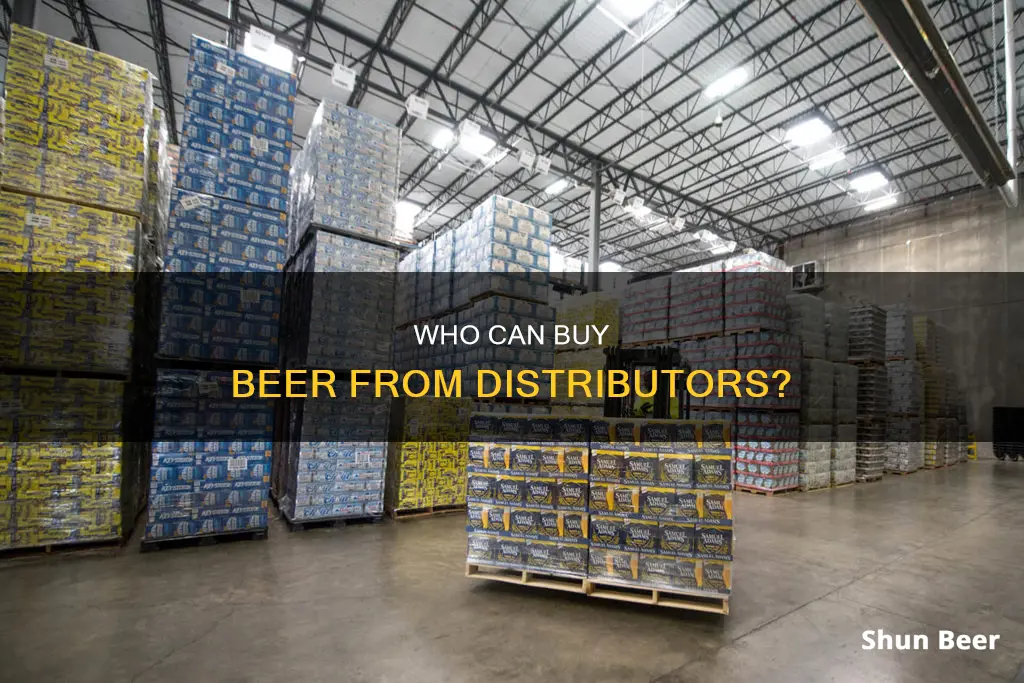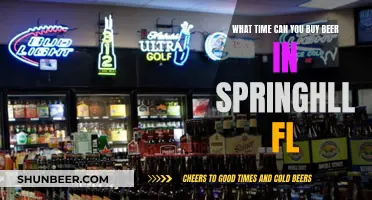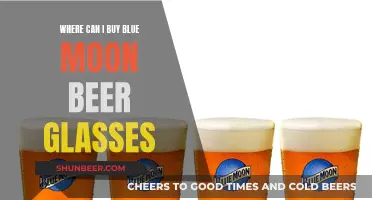
The alcoholic beverage industry is one of the most highly regulated industries, with laws varying from state to state, and even county to county. Beer distribution laws are, however, slightly more relaxed than those for wine and liquor. Most states operate on a three-tier distribution system, where beer is manufactured and sold to a wholesaler or distributor, who then sells it to retailers. In this context, can anyone buy from beer distributors?
What You'll Learn

Beer distribution industry access
The beer distribution industry is open to anyone who wants to enter it, but there are several requirements that must be met to become a licensed distributor. Beer distributors in the United States are required to have both federal and state licenses, even if they only carry one beer brand.
The first step towards starting a beer distribution business is to obtain an Employee Identification Number (EIN) from the IRS by completing IRS Form SS-4. Once you have an EIN, you can start the application process with the United States Alcohol and Tobacco Tax and Trade Bureau (TTB), which regulates the industry. The primary form to be filled out is TTB Form 5100.24, also known as the Application for Basic Permit under the Federal Alcohol Administration Act. This application must be completed following the attached instructions.
If the application is signed by someone other than the individuals listed in Item 9, a TTB Form 5000.8 Power of Attorney must be used. Additionally, if any individual listed on the application is a foreign citizen or has lived or has an association with a foreign country, TTB Form 5000.9 Personnel Questionnaire must also be completed.
The sale and distribution of alcoholic beverages are highly regulated, with laws varying from state to state and even within counties or municipalities within a state. Most states operate on a three-tier distribution system, where the producer sells to a wholesaler/distributor, who then sells to retailers. However, some states allow beer manufacturers and importers to distribute directly to retailers with restrictions. Only 16 states and the District of Columbia do not allow self-distribution of beer.
Keg Buying Guide: Where and How to Purchase
You may want to see also

Federal and state licenses
To operate a beer distribution company legally, you need permits at both the federal and state levels. Without the necessary legal paperwork, you could face fines and other criminal punishments.
Federal Licenses
To obtain a federal license, your first stop will be the Alcohol and Tobacco Tax and Trade Bureau (TTB), which operates under the Department of the Treasury. The TTB ensures that only qualified businesses enter the alcohol industry and that those businesses collect and remit all applicable federal taxes on the products they sell.
For permit and license registrations, TTB breaks alcohol businesses down as follows:
- Alcohol producers and manufacturers (breweries, distilleries, wineries)
- Alcohol importers, wholesalers, and exporters
- Alcohol users and dealers
TTB offers an online tutorial to help you figure out the permits you need. Once you sort that out, you’ll file the appropriate application(s) with TTB. Most applications can be filed online. Allow ample time for your application to be processed.
State Licenses
Next, you have to obtain a license to operate in your home state; this allows you to operate and produce alcoholic beverages in that state. Each state has an entity dedicated to alcohol licenses, regulations, and enforcement, though they go by different names. There’s the New York State Liquor Authority and the Texas Alcoholic Beverage Commission, to name just two.
As at the federal level, there are different state licenses for different business types. For instance, the California Department of Alcoholic Beverage Control (ABC) has separate licenses for beer manufacturers, winegrowers, brandy manufacturers, distilled spirits manufacturers, etc. The ABC typically charges both an application fee and a license fee, and fee amounts can vary by production volume, shipping type (e.g., direct to consumer, wholesale, etc.), and other factors.
The Washington State Liquor and Cannabis Board offers two types of beverage alcohol licenses and numerous licenses under each category:
- Retail licenses for businesses that sell alcoholic beverages at retail, such as grocery stores, nightclubs, restaurants, and theaters
- Non-retail and out-of-state licenses for breweries, distilleries, wineries, distributors, and businesses in other states that ship alcoholic beverages into Washington
The cost of each license varies. A Washington craft distillery license is $100 but a distiller license will run you $2,000. The in-state winery license is either $100 or $400, depending on how many liters of wine are produced per year.
Different licenses come with different privileges. Every state operates differently. Some state operating licenses come with shipping privileges; other states require separate licenses for production and shipping. Licenses for small beverage alcohol producers generally authorize more activities than licenses for large beverage alcohol producers.
For example, the Arizona craft distillery license (for an in-state distillery that produces no more than 20,000 gallons of distilled spirits annually) has “on- and off-sale retail privileges”. The licensee may serve spirits produced on the premises for consumption on the premises, sampling, or to go (in the original, sealed container). The licensee may also sell and deliver to consumers who order by telephone, mail, fax, catalog, or the internet (some restrictions may apply).
Regardless of what your operating license permits, if you ship to consumers in another state, you’ll likely need to register to do business with that state.
Retailers' Freedom to Buy Beer Outside of Exclusive Contracts
You may want to see also

Application process
To become a beer distributor, you will need to obtain permits at both the federal and state levels. The application process is as follows:
Obtain an Employee Identification Number (EIN)
Firstly, you will need to obtain an Employee Identification Number (EIN) from the IRS by completing IRS Form SS-4. This is a crucial step, as you will need this number to issue W-2 forms to your employees at the end of the fiscal year.
Apply for a Doing Business As (DBA) certificate
Next, apply for a Doing Business As (DBA) certificate from your state to reserve the name of your beer distribution company. The state office that handles DBA registration varies but is typically the Secretary of State's Office. The DBA registration form will require your desired company name, personal contact information, and Social Security number. The fee for a DBA is usually between $20 and $50, depending on the state.
Fill out the "Application for Basic Permit"
After obtaining your EIN, visit the U.S. Tax and Trade Bureau website to fill out the "Application for Basic Permit" form. This permit is legally required by the Federal Alcohol Administration Act to operate as a beer distributor. Provide your business name, EIN, personal contact information, and recent residences. Remember to check the "Distilled Spirits Plant" and "Processing" boxes under the "Business To Be Conducted at Premises Address" section.
Obtain state permits
Contact your state's Attorney General's Office or Secretary of State's Office to determine the necessary state permits and licensing requirements for beer distributors. These permits can cost anywhere from a few hundred to a few thousand dollars and may take several weeks to process.
Sign a lease at a commercial property zoned for beer distribution
Find a commercial property in your price range that is zoned for beer distribution. Contact your county clerk to verify the zoning and to inquire about any special proximity laws regarding the location of your business in relation to places like churches and schools.
Sign a lease with a trucking company
Negotiate a truck lease to transport your beer to retail customers. Initially, consider leasing trucks for a few months at a reasonable price. Once your business becomes more established, you can explore purchasing trucks.
Partner with brewers
Many states do not allow brewers to distribute their own beer, and even if they do, they may lack the infrastructure or personnel for shipping. Visit local brewers and inquire about their distribution needs. Offer distribution services at a reasonable cost by considering the cost of your labor and overhead, and the profit you need to make.
Please note that the above process is a general guide, and specific requirements may vary depending on your location. It is always best to consult official sources or seek legal advice for the most accurate and up-to-date information.
Duff Beer: Where to Buy and Enjoy It
You may want to see also

Alcohol industry regulations
In the United States, the distribution and sale of alcohol are subject to both federal and state regulations. To become a licensed beer distributor, one must obtain an Employee Identification Number (EIN) from the IRS and complete the necessary permits with the Alcohol and Tobacco Tax and Trade Bureau (TTB). The TTB's application process ensures that distributors are qualified and will conduct their operations legally and fairly. The Federal Alcohol Administration Act further regulates wholesalers' permissible sales activities, contributing to the diversity of brands in the beer industry.
Trade measurement laws also play a crucial role in regulating the sale of alcohol. In Australia, the National Measurement Act 1960 and the National Trade Measurement Regulations 2009 dictate how alcohol is sold by volume. The National Measurement Institute (NMI) enforces these regulations, deploying inspectors to ensure compliance. Non-compliance can result in significant fines.
Additionally, specific regulations govern the sale of different types of alcohol. For instance, beer sold on tap must be served in approved batch-tested glassware or jugs, with the volume clearly marked in milliliters or liters. Similarly, spirits like brandy, gin, rum, vodka, and whiskey must be sold by volume using NMI-approved spirit measures. These measures come in specific capacities and are made of rigid or semi-rigid materials.
Sunday Beer Buying in North Carolina: When's the Right Time?
You may want to see also

Self-distribution laws
The beer distribution industry is highly regulated, with each state, and sometimes counties or municipalities within a state, creating and enforcing their own laws. Most states operate on a three-tier distribution system, where a producer sells to a distributor, who then sells to a retailer. However, despite this, many states allow beer manufacturers and importers to distribute their products directly to retailers, with some restrictions.
In fact, only 16 states and the District of Columbia don't allow self-distribution of beer. For example, California allows any manufacturer, except those with a Type 75 Brewpub license, to sell directly to licensed retailers. In Arkansas, self-distribution is restricted to manufacturers who sell at least 35% of their produce within the state.
Self-distribution can be costly and difficult to implement outside of a 100-mile radius, so many smaller beer producers self-distribute for the first few years while the brand is small and distribution is manageable.
Kilkenny Beer: Where to Buy in the US?
You may want to see also
Frequently asked questions
No, only licensed retailers can buy from beer distributors.
Most states operate on a three-tier distribution system where a producer manufactures and sells to a wholesaler/distributor, who then sells to retailers.
Yes, in less-populated areas, larger retailers are allowed to act as distributors to smaller retailers, creating a four-tier system. Additionally, 16 states and the District of Columbia allow beer manufacturers and importers to self-distribute directly to retailers with some restrictions.
Beer distributors in the US are required to have both federal and state licenses. The first step is to obtain an Employee Identification Number (EIN) from the IRS, followed by permits from the Alcohol and Tobacco Tax and Trade Bureau (TTB). Distributors must also register any facility holding food or beer with the FDA due to the Bioterrorism Act.
The laws regarding the sale and distribution of alcoholic beverages vary across states, counties, and municipalities in the US. However, beer distribution laws are generally more relaxed than those for wine and liquor.







